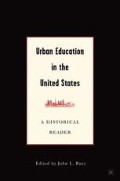Abstract
“The Mexican American community is beginning to rumble,” noted Ben Canales, an official with a Mexican American community group by the name of United Organizations Information Center.1 This comment was made at a committee meeting before the Houston board of education in October 1969 and aptly reflected the Chicano community’s growing dissatisfaction with the local school district’s unwillingness to improve the conditions under which Mexican American children were educated.
Access this chapter
Tax calculation will be finalised at checkout
Purchases are for personal use only
Preview
Unable to display preview. Download preview PDF.
Notes
Arnoldo De Leon, Ethnicity in the Sunbelt: A History of Mexican Americans in Houston (Houston: Mexican American Studies, University of Houston, 1989), 163–170.
Thomas H. Kreneck, Del Pueblo: A Pictorial History of Houston’s Hispanic Community (Houston: Houston International University, 1989), 151–152.
Guadalupe San Miguel, Let All of Them Take Heed: Mexican Americans and the Quest for Educational Equality in Texas, 1910–1981 (Austin: University of Texas Press, 1987), 141.
For a history of the Little Schools of the 400 see ibid., 139–163; also Guadalupe Campos Quintanilla, “The Little School of the 400 and Its Impact on Education for the Spanish Dominant Bilingual Children of Texas” (Ph.D. diss., University of Houston, 1976).
For data on the success of this program in improving school achievement, see Texas Education Agency, Report on the Preschool Instructional Program (Austin: Texas Education Agency, 1962). See also San Miguel, 155–157.
The “Mexican American Generation” was comprised of both middle and workingclass individuals who were born or raised in the United States. Community leaders from this group embraced a liberal version of cultural pluralism and a politics of cautious activism. Mario T. Garcia, Mexican Americans: Leadership, Ideology, and Identity, 1930–1960 (New Haven: Yale University Press, 1989), 13–22.
For one recent history of the Chicano student movement and its ideological development, see Carlos Munoz, Youth, Identity, Power: The Chicano Movement (New York: Verso, 1989).
In the early 1970s, a fringe group of Mexican American youth did advocate drastic or fundamental change in the socioeconomic and educational structures of the society. But, for the most part, both the youth and the older generation wanted pluralist reforms and militant changes in the society, not significant or revolutionary ones. For a history of the political ideologies of students in the broader Chicano movement of the late 1960s see Juan Gomez-Quinones, Chicano Politics: Reality and Promise, 1940–1990 (Albuquerque; University of New Mexico Press, 1990).
MALDEF, Diez Anos (San Antonio: MALDEF, 1978); “Chicanos Boycott High School,” Compass 2, no. 9 (December 1968): 1.
USCCR, Hearings Before the United States Commission on Civil Rights, San Antonio, December 9–14, 1968 (Washington, D.C.: Government Printing Office, 1968).
Raul Gutierrez, “Mexican Americans Boycott Elsa High School—Greater Houston—Uneasy?,” Compass 2, no. 9 (December 1968): 2.
Luis Cano, “A History of Segregation and the Chicano Movement” (unpublished book manuscript, Houston, 1977), Chapter 6, 2–10.
For one scholar’s analysis of linguistic and cultural biases in the testing of Mexican American children in the public schools, see Blandina Cardenas, “Defining Equal Access to Educational Opportunity for Mexican American Children: A Study of Three Civil Rights Actions Affecting Mexican American Students” (Ph.D. diss., University of Massachusetts, 1974).
Editor information
Editors and Affiliations
Copyright information
© 2005 John L. Rury
About this chapter
Cite this chapter
Miguel, G.S. (2005). “The Community is Beginning to Rumble”: The Origins of Chicano Educational Protest in Houston, 1965–1970. In: Rury, J.L. (eds) Urban Education in the United States. Palgrave Macmillan, New York. https://doi.org/10.1057/9781403981875_13
Download citation
DOI: https://doi.org/10.1057/9781403981875_13
Publisher Name: Palgrave Macmillan, New York
Print ISBN: 978-1-349-53020-5
Online ISBN: 978-1-4039-8187-5
eBook Packages: Palgrave Social & Cultural Studies CollectionSocial Sciences (R0)

